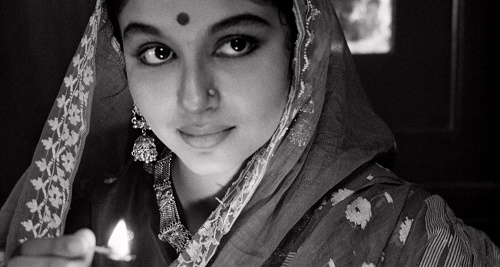
Two decades after its original negatives were burned in a fire, Satyajit Ray’s breathtaking milestone of world cinema rises from the ashes in a meticulously reconstructed new 4K restoration. The Apu Trilogy brought India into the golden age of international art-house film, following one indelible character, a free-spirited child in rural Bengal who matures into an adolescent urban student and finally a sensitive man of the world. These delicate masterworks—Pather Panchali (Song of the Little Road), Aparajito (The Unvanquished) and Apur Sansar (The World of Apu)—based on two books by Bibhutibhusan Banerjee, were shot over the course of five years, and each stands on its own as a tender, visually radiant journey unto itself. These are among the most achingly beautiful, richly humane movies ever made—essential works for any film lover. www.janusfilms.com
The release of Satyajit Ray’s debut Pather Panchali in 1955 introduced to the world an eloquent and important new cinematic voice. A depiction of rural Bengali life told in a style inspired by Italian neorealism, this realistic yet poetic evocation of a number of years in the life of a family introduces us both to a free-spirited little boy named Apu (Subir Banerjee) and, just as essentially, the women who will help shape and define him: his independent older sister; his harried mother, who, with her husband often away, must hold the family together; and his kindly and mischievous elderly “auntie”—vivid, multifaceted characters all. With resplendent photography informed by its young protagonist’s constant sense of discovery, the Cannes-awarded Pather Panchali is an immersive cinematic experience and a film of elemental power. Music by Ravi Shankar.
Satyajit Ray had not planned to make a sequel to Pather Panchali, but after the film’s international success he decided to continue Apu’s narrative. Aparajito picks up where the first film left off, with Apu (now played by Smaran Ghosal) and his family having moved away from the country to live in the bustling holy city of Benares. As Apu progresses from wide-eyed child to intellectually curious teenager, eventually studying in Kolkata, we watch the formation of a life that grows ever richer in moral and emotional complexity, in regards to both his studies and his relationship with his mother. This tenderly expressive, often heart-wrenching film, which won three top prizes at the Venice Film Festival, including the Golden Lion, not only extends but also spiritually deepens the tale of Apu. Music by Ravi Shankar.
By the time The World of Apu (Apur Sansar) was released, Satyajit Ray had directed not only the first two Apu films but also the masterpiece The Music Room, and was well on his way to becoming a legend. This extraordinary final chapter brings our protagonist’s journey full circle. Apu (Soumitra Chatterjee) is now in his early twenties, out of college, and hoping to live as a writer. Alongside his professional ambitions, the film charts his romantic awakening, which occurs as the result of a most unlikely turn of events, and his eventual, fraught fatherhood. Featuring soon-to-be Ray regulars Chatterjee and Sharmila Tagore in star-making performances, and showing Ray’s ever more impressive skills as a crafter of pure cinematic imagery, The World of Apu is a breathtaking conclusion to this monumental trilogy. Music by Ravi Shankar.
Exclusive Engagement of “THE APU TRILOGY” opens Friday, June 26, at Landmark’s Kendall Square Cinema. Show Times and Information: (617) 621-1202 or click HERE.


